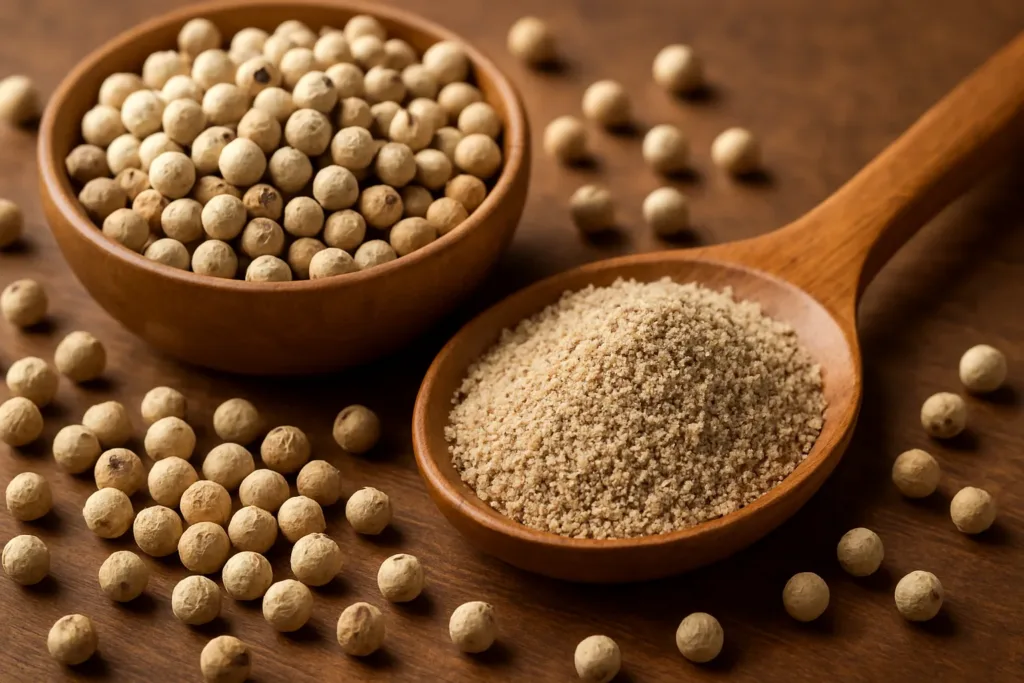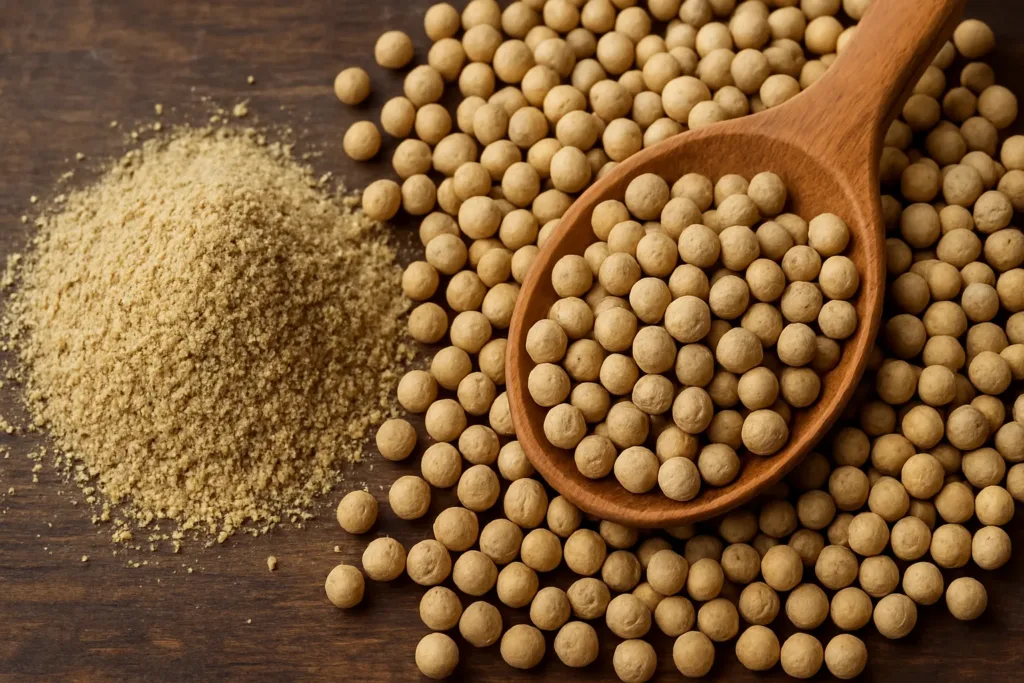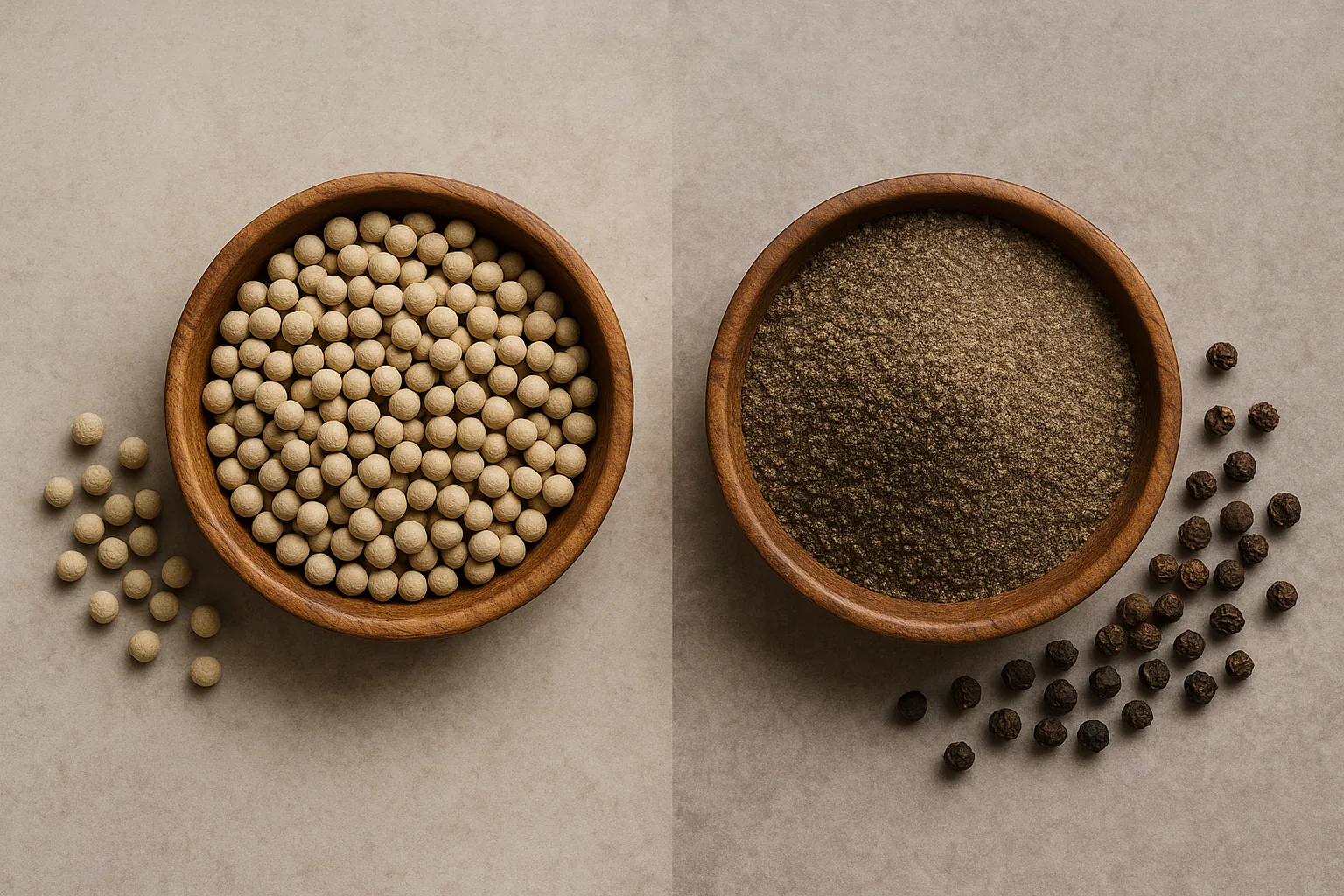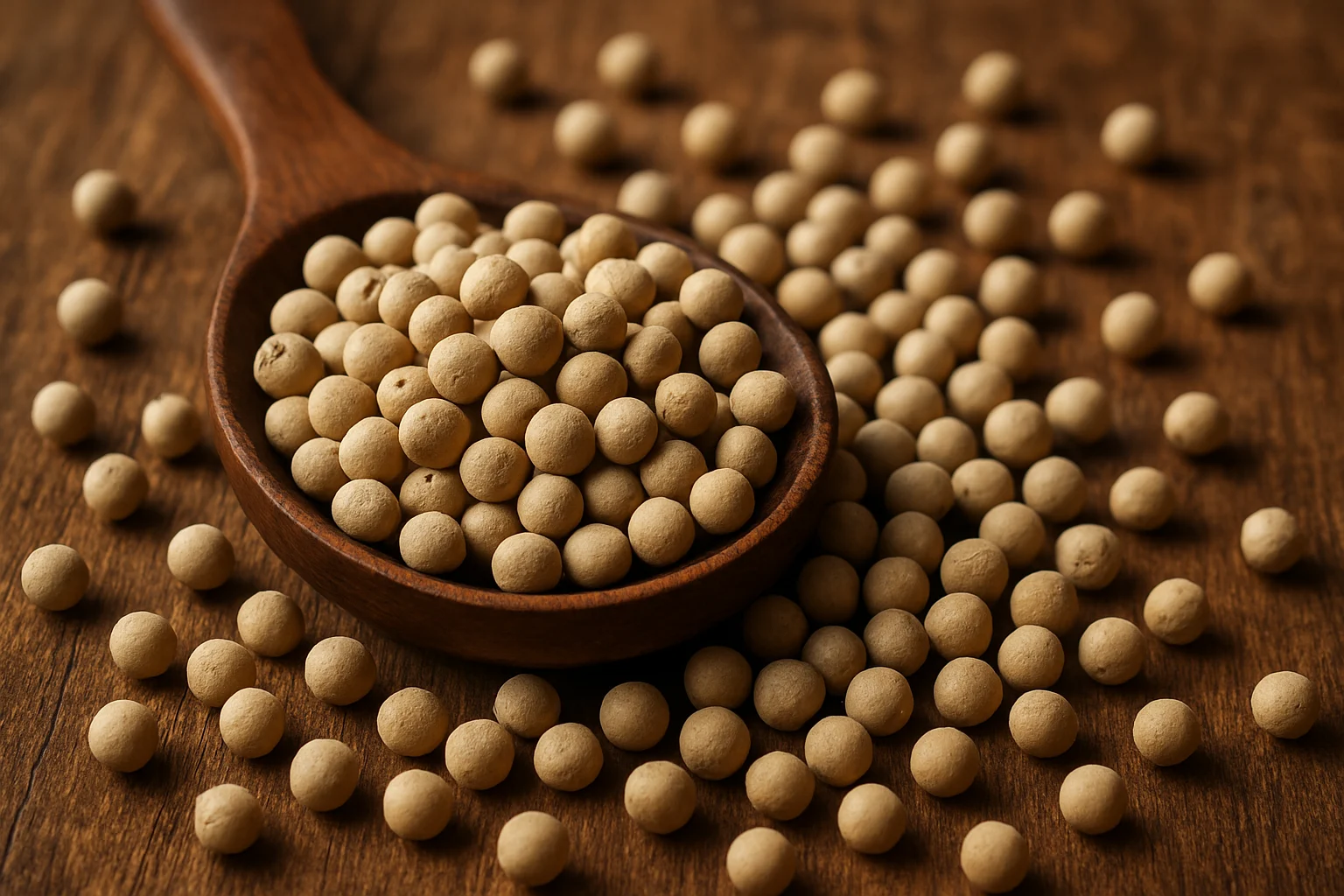
Did you know that white pepper and black pepper come from the same plant but have different flavours and culinary uses? While black pepper is known for its bold and pungent taste, white pepper offers a milder, smoother heat that blends seamlessly into light-coloured dishes.
White pepper is an essential spice in many cuisines, particularly in Asian, European, and Indian cooking, where it adds a peppery flavour without the visible black specks. At Kerala Spices Online, we provide high-quality white pepper sourced directly from Kerala’s spice farms. Whether you are looking to buy white pepper online or learn more about its unique properties, this guide covers everything you need to know.
What is White Pepper?

White pepper is a spice derived from the Piper nigrum plant, the same source as black pepper. The difference lies in its processing method.
Processing White Pepper
- Harvesting: Fully ripe red pepper berries are selected.
- Soaking & Fermentation: The berries are soaked in water for about 10 days, allowing the outer skin to loosen.
- Drying & Grinding: The peeled seeds are dried and ground into a fine powder or left whole.
This unique processing of white pepper gives it a distinctive flavour, different from black pepper.
White Pepper vs. Black Pepper: What’s the Difference?

Due to different processing methods, the plant produces both black pepper and white pepper, which have different taste profiles together with distinct applications.
Harvesting and Preparation
Unripe green berries are dried into black pepper by creating its characteristic dark wrinkled exterior.
The manufacturing process of white pepper begins with soaking ripe black peppercorns until they ferment before removing their outer coating.
Taste and Aroma Profile of White Pepper
The taste of white pepper consists of an earthy base with subtle fermentation notes that provide a gentle peppery heat sensation.
Black Pepper: Pungent, spicy, and more complex, with an intense kick.
White pepper serves delicate meals perfectly since its appearance produces no noticeable black specks.
White pepper has a distinct taste and aroma that make it unique.
Flavour Profile: Mild, slightly musty, and earthy, with a sharper bite than black pepper.
Aroma: Some describe it as grassy or fermented, due to the soaking process.
While some find white pepper sharper, it generally lacks the depth and complexity of black pepper.
Culinary Uses of White Pepper
Cooking with White Pepper
White pepper is used in dishes where a smooth, peppery heat is needed without visible specks.
Popular Dishes
Cream-based soups and sauces – Béchamel, mashed potatoes, clam chowder.
Asian Cuisine – Hot and sour soup, stir-fries, marinades, and Thai curries.
European Dishes – Swedish meatballs (Vitpeppar), light-colored gravies, and creamy pasta.
Want to explore more recipes? Check out our blog post “From Soup to Stir-Fry: Discovering White Pepper’s Recipe Brilliance.”
Health Benefits of White Pepper
White pepper is not just a spice—it also offers several health benefits due to its key compound, piperine.
Benefits of Piperine
Anti-Inflammatory: Helps reduce joint pain and swelling.
Improves Digestion: Stimulates digestive enzymes, aiding nutrient absorption.
Supports Respiratory Health: Traditionally used to ease congestion and improve breathing.
Traditional Uses
White pepper has been used in traditional medicine for:
Treating digestive issues like bloating and indigestion.
Relieving cold and flu symptoms.
Managing pain and inflammation.
Although piperine is linked to these benefits, research that is more scientific is needed to confirm its effectiveness.
Potential Side Effects and Precautions
White pepper is safe in normal food amounts, but excessive consumption may cause certain side effects.
Common Side Effects
- Burning Sensation: Can cause a burning aftertaste or mild irritation when overused.
- Allergic Reactions: Some individuals may experience skin irritation or respiratory discomfort.
- Nasal Irritation: When used as a nasal spray, piperine may cause sneezing, coughing, or a runny nose.
Special Warnings and Precautions
- Pregnancy & Breastfeeding: High doses should be avoided.
- Children: Excessive consumption may be unsafe.
- Surgery: White pepper may interfere with blood clotting, so it is best to stop consuming it two weeks before surgery.
- Diabetes & Blood Thinners: Can interact with anticoagulants and diabetes medications, affecting blood sugar levels.
If you have any underlying medical conditions, consult your doctor before consuming large amounts of white pepper.
How to Store White Pepper
Proper storage ensures white pepper retains its flavour and potency for a longer time.
Storage Tips:
- Keep in an airtight container to prevent moisture and contamination.
- Store in a cool, dry place, away from direct sunlight.
- Avoid plastic containers, as they may absorb flavours over time.
Shelf Life
- Whole white peppercorns last up to three years when stored properly.
- Ground white pepper loses its potency faster and should be used within six months for the best flavour.
- Proper spice storage keeps your white pepper fresh and aromatic for all your culinary needs.
Frequently Asked Questions (FAQs)
Is white pepper different from black pepper?
Yes, while both come from the same plant, black pepper is made from unripe, dried berries, whereas white pepper is made from fully ripe, fermented berries with the outer skin removed. This results in distinct flavour profiles and culinary uses.
What is white pepper best for?
White pepper is best for light-coloured dishes, such as:
Creamy soups & sauces (béchamel, clam chowder, mashed potatoes).
Asian cuisine (hot and sour soup, stir-fries, marinades).
European dishes (Swedish meatballs, white gravies).
It is a versatile spice, adding mild heat without visual specks in food.
Why is white pepper more expensive than black pepper?
White pepper is costlier due to its complex processing method. The fermentation and removal of the outer skin require additional labour and time, making production more expensive compared to black pepper.
Conclusion
As a flexible culinary component, white pepper creates a subtle hot flavour that elevates multiple food dishes. The kitchen cannot work without white pepper because it strengthens soups and sauces in addition to potentially providing wellness advantages.
Looking for premium-quality white pepper? You can acquire the highest quality Kerala white pepper through online purchases at Kerala Spices Online from Kerala’s plentiful spice farmlands.
You ought to improve your cooking with pure white pepper that offers intense flavour.


Comments are closed.